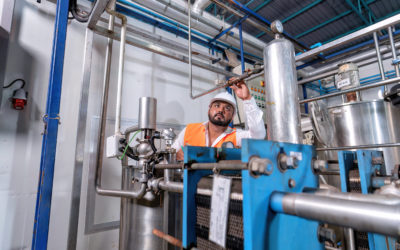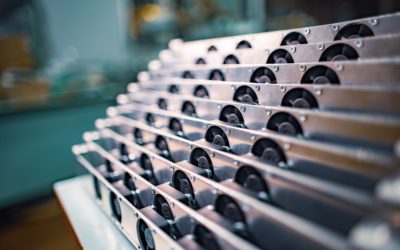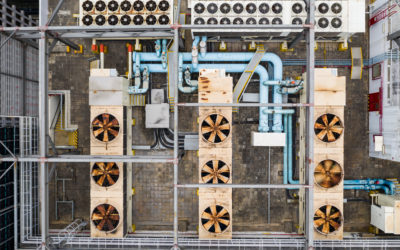Solving Heat Exchanger Failures in Petrochemical Refineries with HeatX
Heat exchanger failures are a persistent problem in industries, particularly in petrochemical refineries, where corrosion poses significant risks. The deterioration of heat exchanger tubes can lead to equipment failure, resulting in downtime, expensive repairs, and contamination of production fluids. The aim of this article is to discuss how HeatX, an advanced nanocomposite surface treatment, can help prevent corrosion and erosion-corrosion, ensuring the longevity of heat exchanger systems.
Understanding Heat Exchanger Corrosion
Corrosion in heat exchangers, especially in petrochemical industries, is caused by several factors. Heat exchangers in refineries are prone to various forms of corrosion, including uniform corrosion, pitting, crevice corrosion, and microbiologically induced corrosion. The use of materials like carbon steel, widely chosen for their cost-effectiveness, makes these systems even more vulnerable to aggressive substances in the process fluids, such as CO₂ and chloride ions.
For instance, in methanol production, CO₂ gas combined with water can form carbonic acid, lowering the pH of the fluid and accelerating corrosion. In addition, solid particles from earlier stages of the refining process, such as catalyst detritus, can increase erosion-corrosion, worsening the condition of heat exchanger tubes.
Recent Study Findings on Heat Exchanger Failures
A recent study investigating heat exchanger tube failures in a petrochemical refinery revealed that corrosion caused by solute CO₂ was less significant than initially thought. The primary cause of damage to the carbon steel tubes was attributed to erosion-corrosion. Solid particles, detached from catalysts in earlier processing stages, were found to have high hardness and were causing severe abrasion on the outer surface of the tubes. These particles, combined with the corrosive effects of CO₂ and water, resulted in cavities that compromised the integrity of the heat exchanger.
The study emphasized the importance of implementing better corrosion prevention methods and choosing suitable materials or protective coatings to combat these issues.
How HeatX Can Prevent Corrosion and Erosion-Corrosion
HeatX, a revolutionary nanocomposite surface treatment, is specifically designed to protect heat exchanger surfaces from corrosion and erosion-corrosion. Here’s how HeatX can provide significant benefits to industries facing corrosion-related challenges:
- Corrosion Resistance: HeatX forms a durable, omniphobic barrier that prevents corrosive substances, such as CO₂ and water, from reaching the surface of the heat exchanger tubes. This dramatically reduces the risk of corrosion, even in highly acidic environments.
- Erosion Protection: The unique low-friction properties of HeatX minimize the wear caused by abrasive particles. This is particularly important in preventing erosion-corrosion, which was identified as the primary cause of tube failure in the study. HeatX ensures that solid particles do not adhere to or abrade the surface, extending the operational lifespan of the equipment.
- Increased Efficiency: By reducing the buildup of deposits and corrosion-related damages, HeatX improves the efficiency of heat transfer within the exchanger. This results in better performance, lower maintenance costs, and fewer unplanned shutdowns.
- Long-Term Durability: HeatX is engineered to withstand harsh conditions, including fluctuating temperatures and pressures. This makes it ideal for use in petrochemical refineries and other industrial applications where heat exchangers are exposed to extreme environments.
- Environmentally Friendly Solution: HeatX is a non-toxic, water-based formulation that can be applied without harming the environment. This makes it a sustainable choice for industries aiming to reduce their environmental footprint.
Investing in HeatX for Reliable Heat Exchangers
Corrosion and erosion-corrosion are two of the biggest threats to the efficiency and longevity of heat exchangers. By investing in advanced coatings like HeatX, industries can significantly reduce the risk of equipment failure and costly downtime. HeatX not only protects against the damaging effects of CO₂ and solid particles but also enhances heat exchangers’ overall performance and reliability.
For petrochemical refineries and other industries relying on heat exchangers, implementing HeatX is a proactive solution that ensures operational continuity, reduced maintenance costs, and enhanced safety.
Heat exchanger corrosion is critical in petrochemical refineries, causing extensive damage and operational challenges. The combination of electrochemical corrosion and erosion corrosion can lead to severe equipment failure if not properly managed. HeatX, with its advanced nanocomposite coating, offers a powerful solution by protecting heat exchanger tubes from both corrosion and erosion, ultimately enhancing the longevity and performance of the system. By applying HeatX, industries can prevent costly shutdowns and ensure efficient, reliable operations. Apply HeatX and learn more from our experts.



